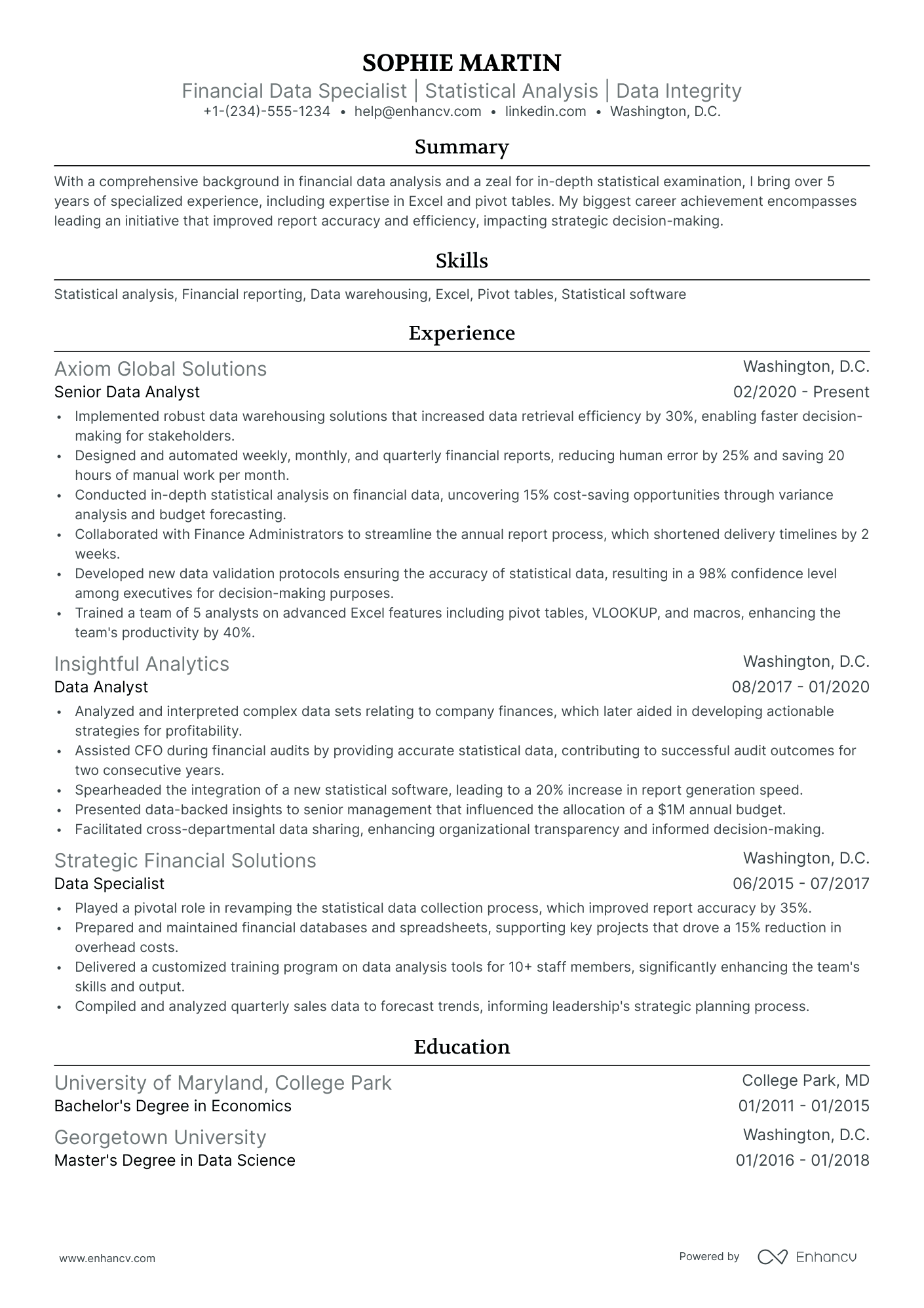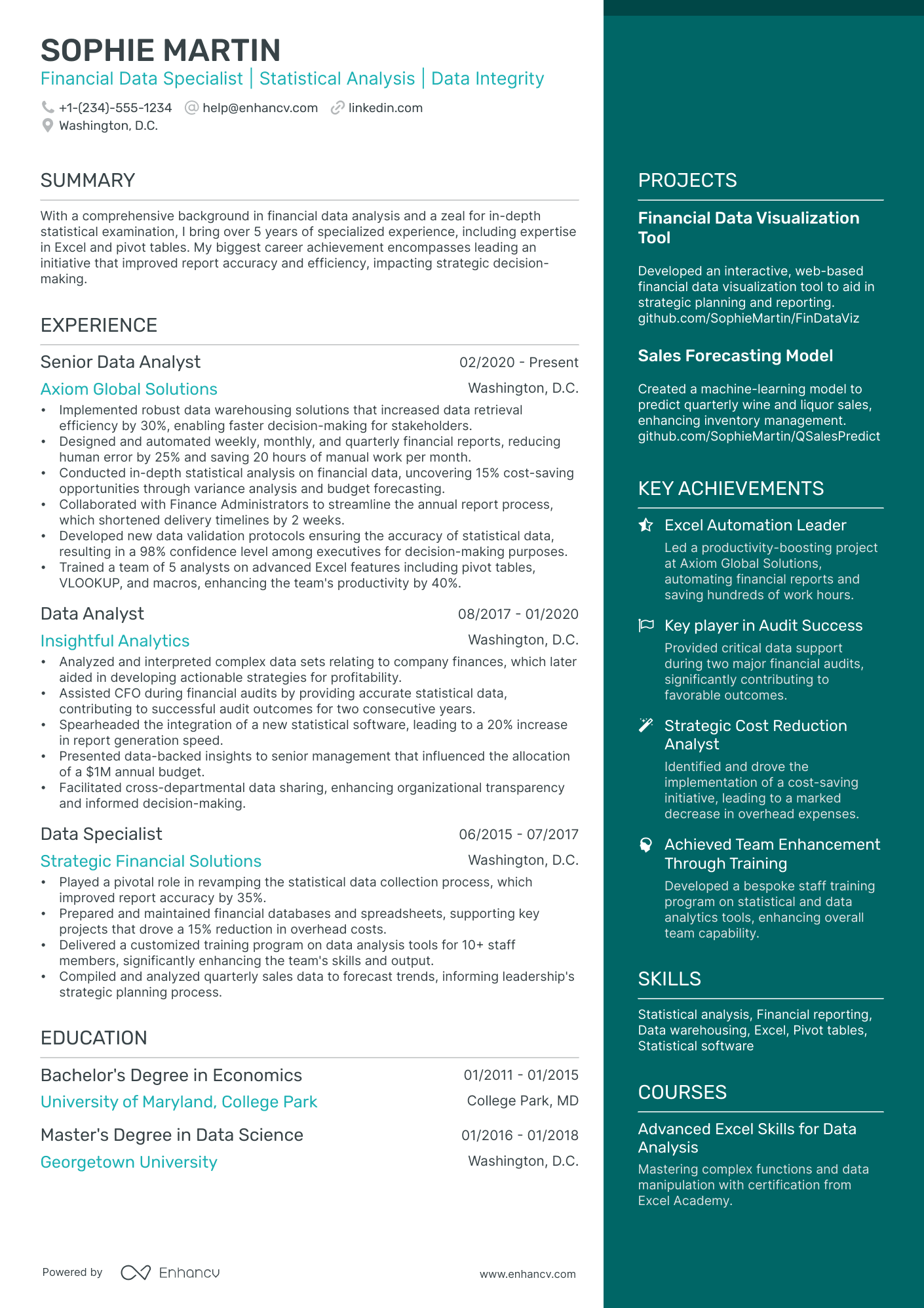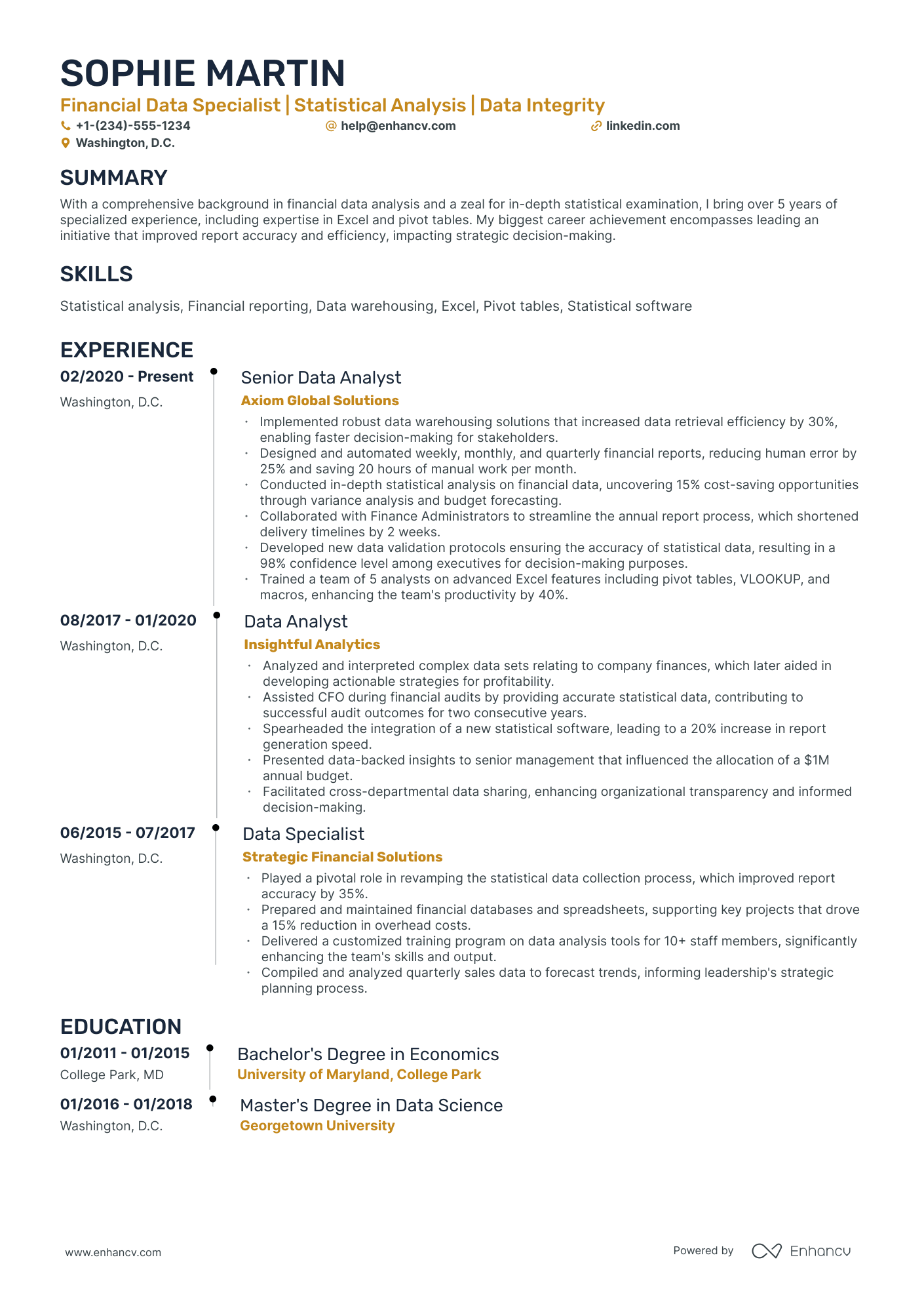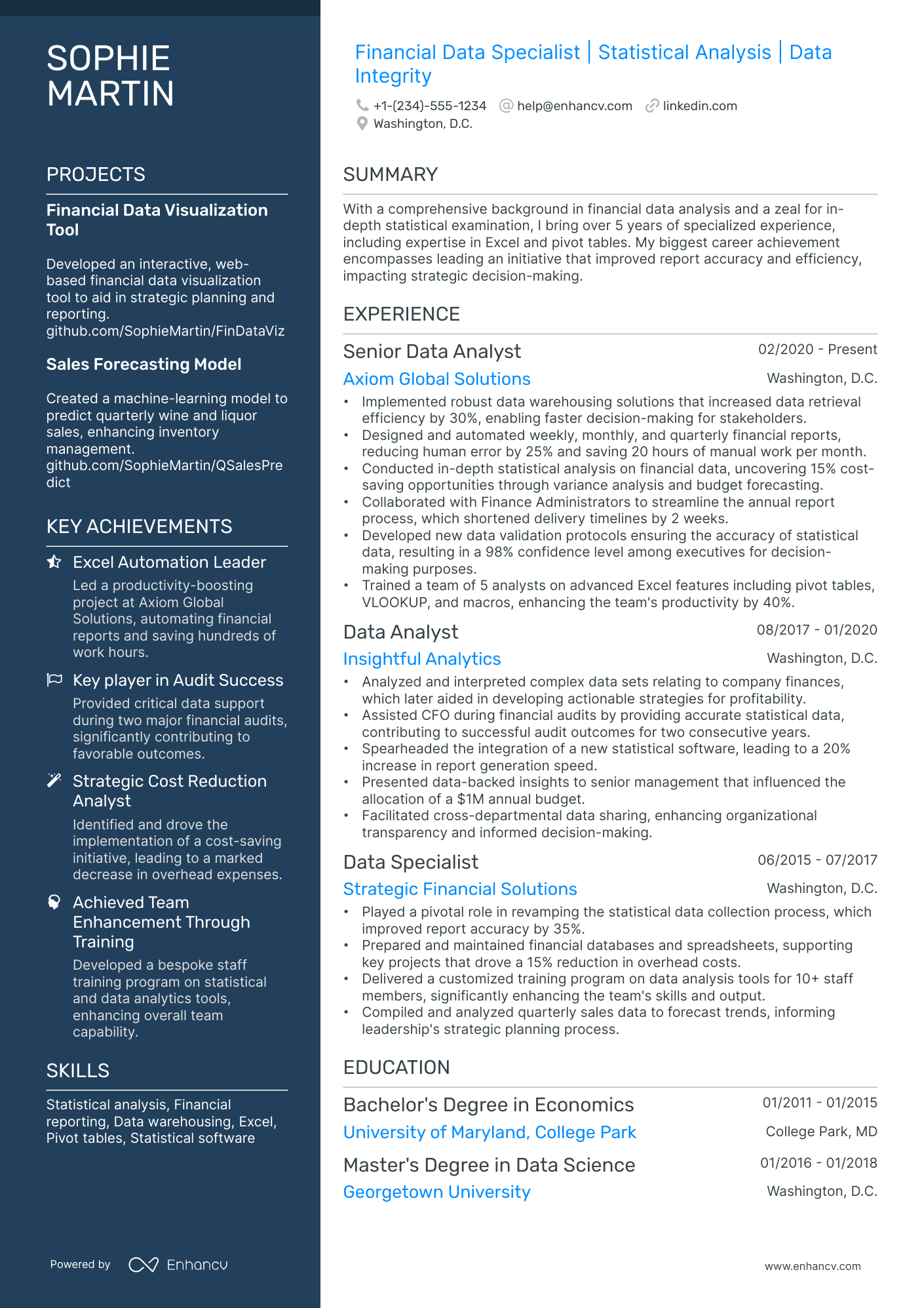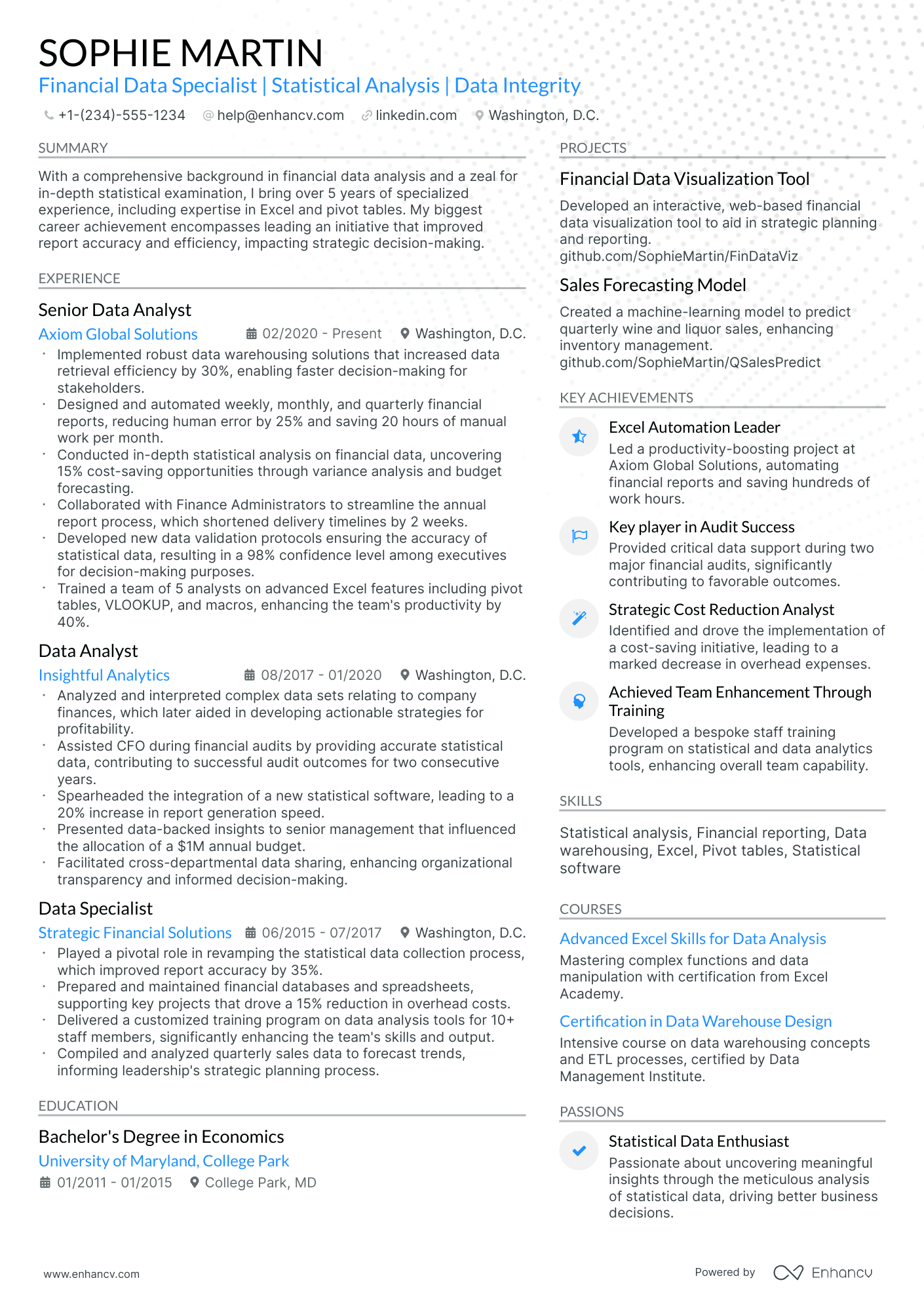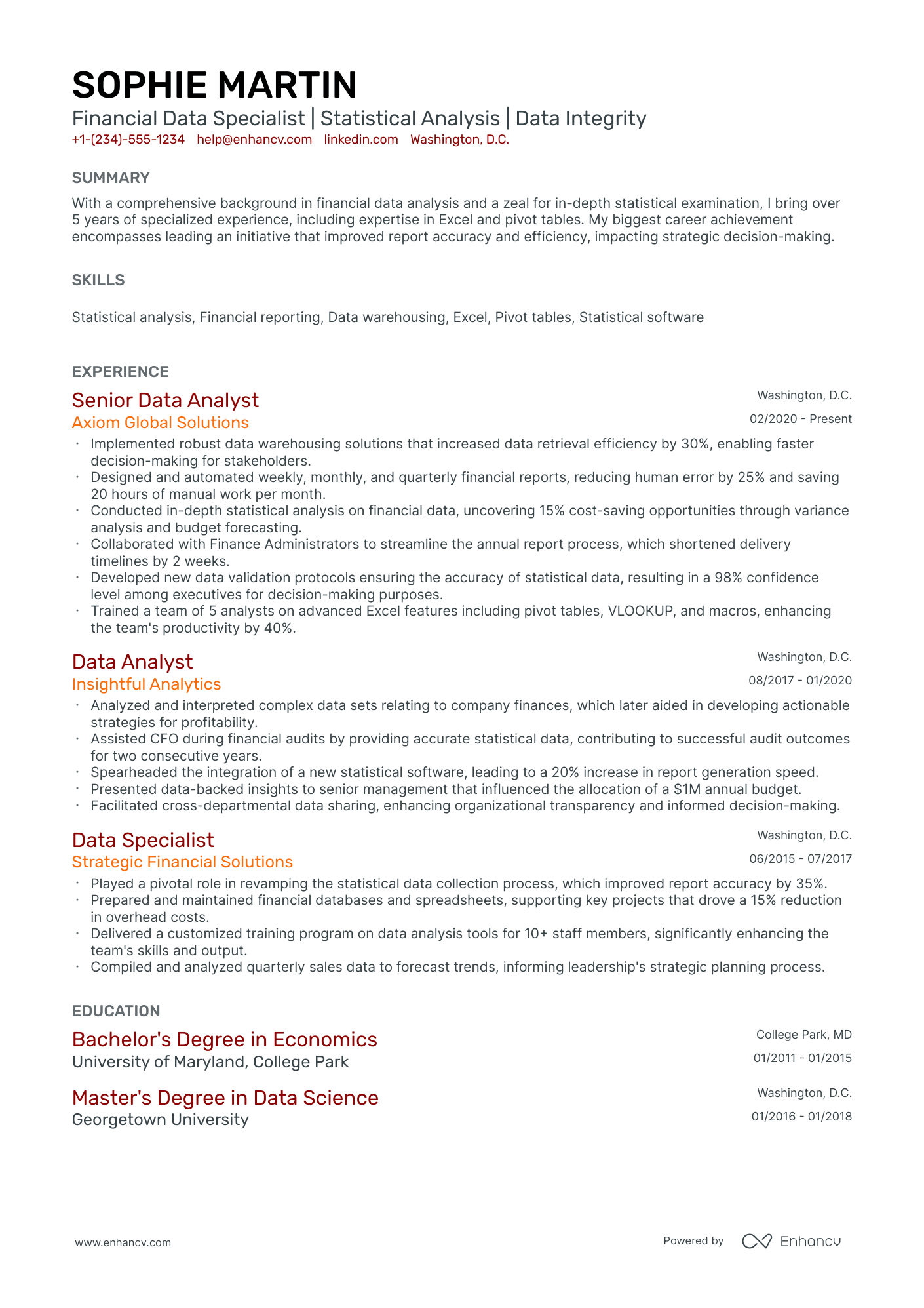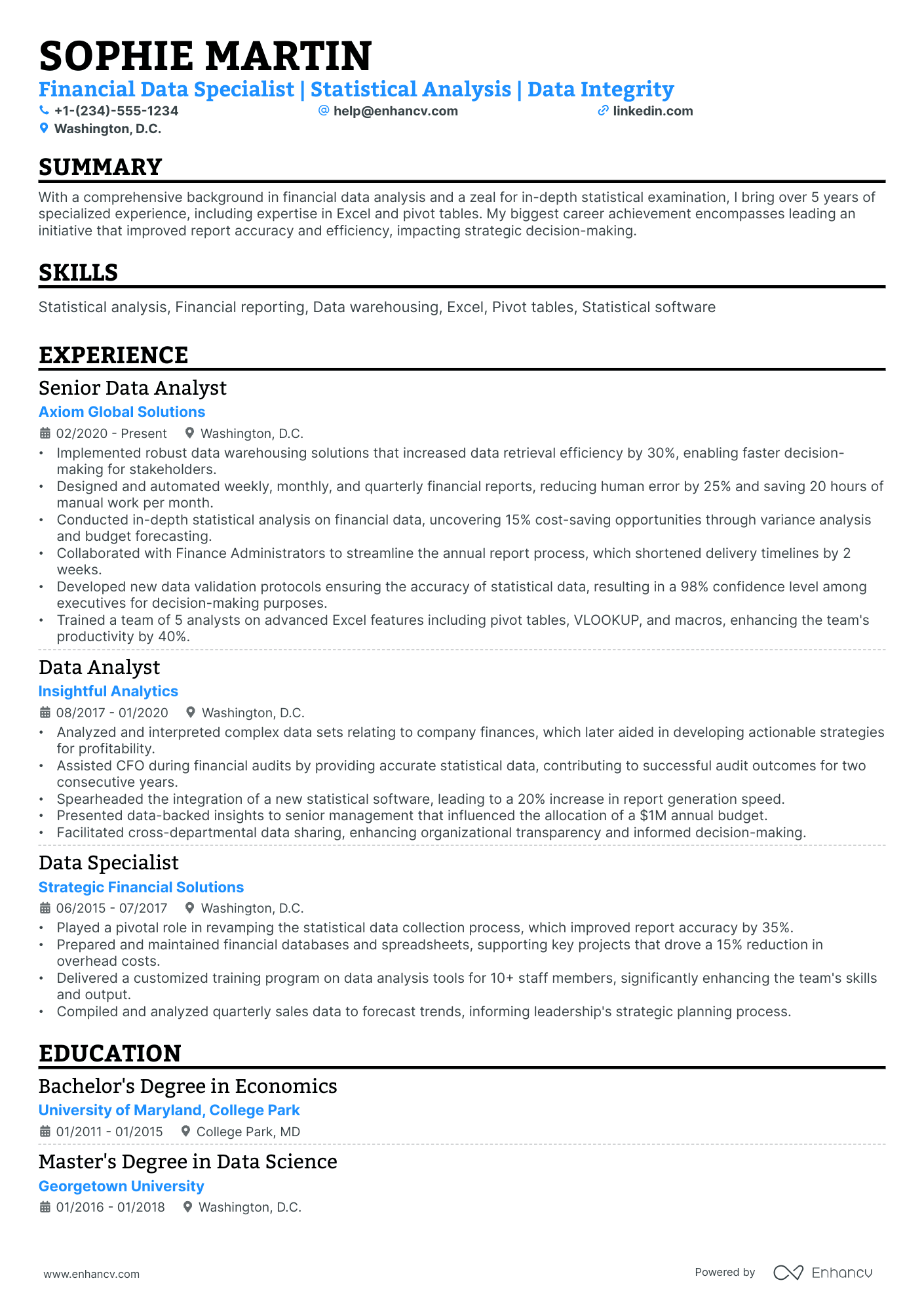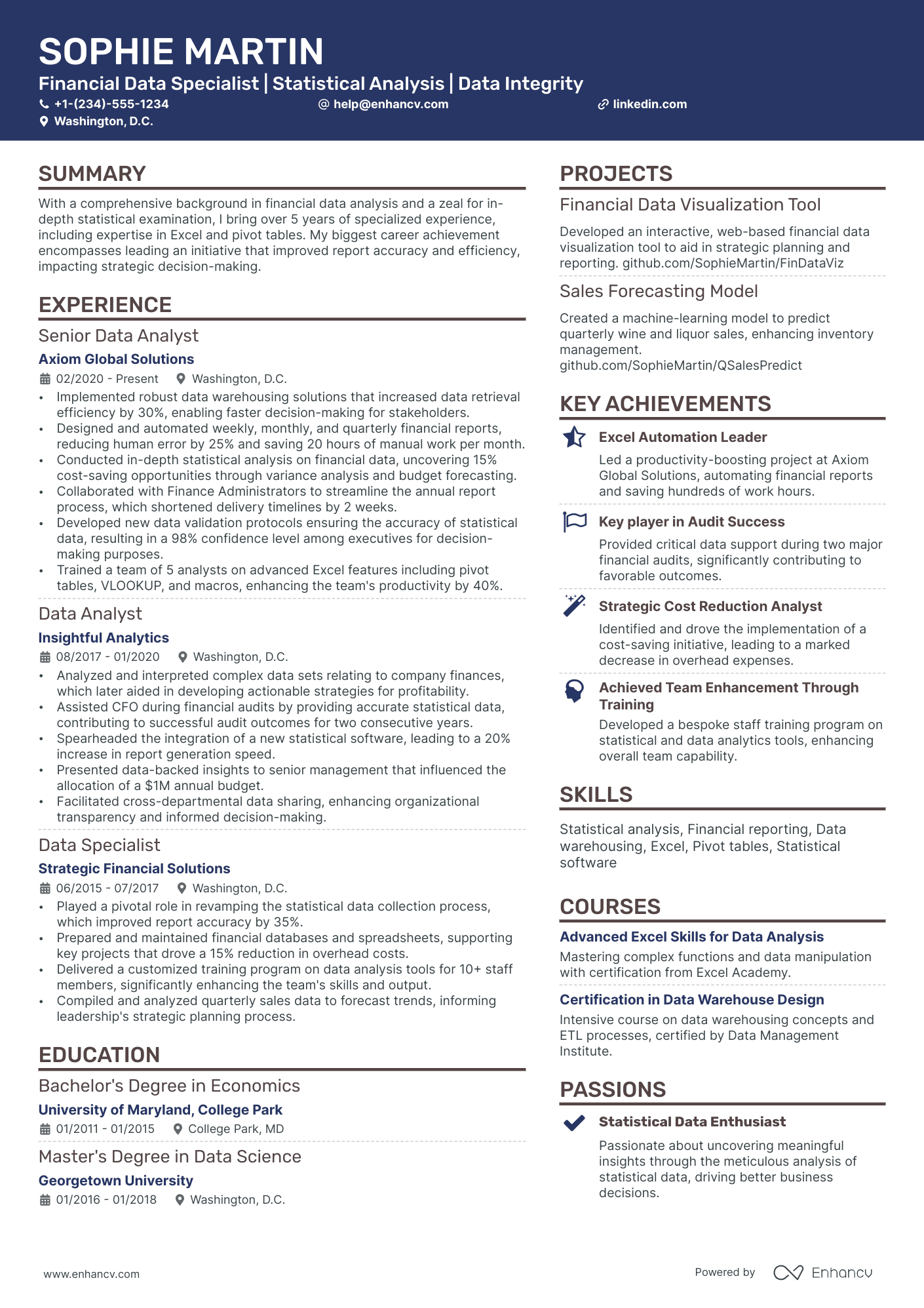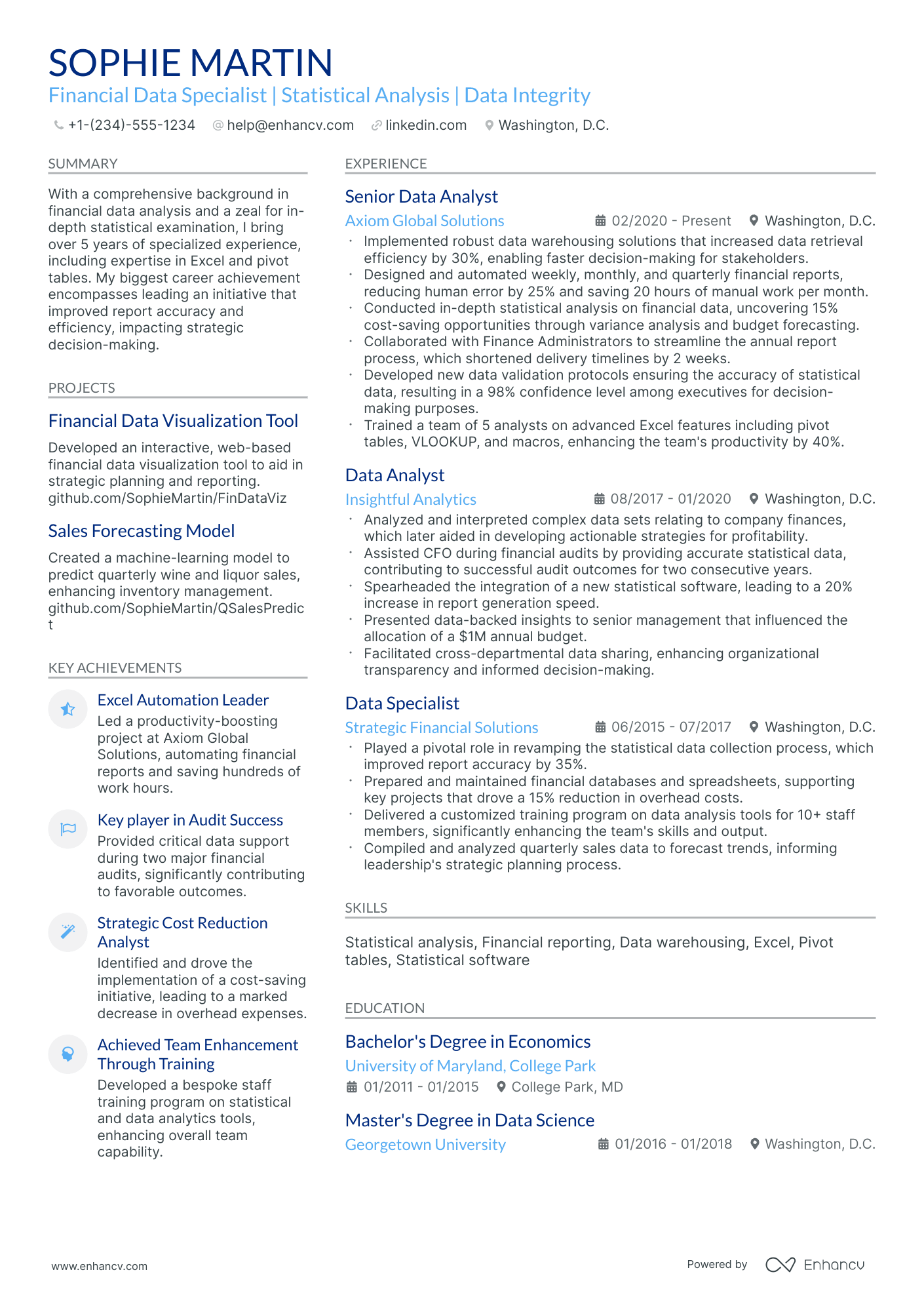As a data specialist, articulating complex technical experience into a concise and comprehensible resume form can be particularly challenging. Our guide offers clear strategies and examples to help you effectively translate your data expertise into standout resume points that hiring managers will notice.
- Get inspired from our data specialist resume samples with industry-leading skills, certifications, and more.
- Show how you can impact the organization with your resume summary and experience.
- Introducing your unique data specialist expertise with a focus on tangible results and achievements.
If the data specialist resume isn't the right one for you, take a look at other related guides we have:
Creating the best data specialist resume format: four simple steps
The most appropriate data specialist resume format is defined by precision and a systematic approach. What is more, it should reflect upon how your application will be assessed by recruiters. That is why we've gathered four of the most vital elements to keep in mind when designing your resume:
- It's all about presenting how your experience or skills align with the job. Use the reverse-chronological resume format , if your expertise is relevant to the data specialist role. Otherwise, select the functional skill-based resume format or the hybrid resume format to shift the focus to your skill set.
- Resume header - make sure you've filled out all relevant (and correct) information, like your contact details and link to your portfolio.
- Resume length - unless you've over a decade of applicable expertise in the field, stick with a one-page resume format. If you'd like to present more of your professional experience, go up to two pages.
- Resume file - submit your data specialist resume in a PDF format to ensure all information stays in the same place.
Adjust your resume layout based on the market – Canadian resumes, for example, may follow a unique format.
Upload & Check Your Resume
Drop your resume here or choose a file. PDF & DOCX only. Max 2MB file size.
PRO TIP
The more time and effort you've put into obtaining the relevant certificate, the closer to the top it should be listed. This is especially important for more senior roles and if the company you're applying for is more forward-facing.
The five (plus) definite sections your resume for a data specialist job should include are:
- Header with your headline, contact details, and/or a preview of your work
- Summary (or objective) to pinpoint how your success aligns with the role
- Experience with bullets of your most relevant achievements in the field
- Skills to integrate vital job requirements (both technical and personal)
- Your further dedication to the field, showcased via relevant higher education and/or certifications
What recruiters want to see on your resume:
- Proficiency in data management software and tools like SQL, Python, R, Excel, and data visualization tools such as Tableau or Power BI.
- Experience with data cleaning, transformation, and analysis, demonstrating the ability to handle large datasets efficiently.
- Knowledge of machine learning techniques and data mining, showing a capacity to derive predictive insights from complex data.
- Understanding of database architecture, data warehousing, and data modeling to ensure that the storage and organization of data meet business needs.
- Proven track record of problem-solving abilities with quantitative data, statistical analysis, and interpretation of data-driven business strategies.
Advice for your data specialist resume experience section - setting your application apart from other candidates
Your resume experience section needs to balance your tangible workplace achievements with job requirements.
The easiest way to sustain this balance between meeting candidate expectations, while standing out, is to:
- Select really impressive career highlights to detail under each experience and support those with your skills;
- Assess the job advert to define both the basic requirements (which you could answer with more junior roles) and the more advanced requirements - which could play a more prominent role through your experience section;
- Create a separate experience section, if you decide on listing irrelevant experience items. Always curate those via the people or technical skills you've attained that match the current job you're applying for;
- Don't list experience items from a decade ago - as they may no longer be relevant to the industry. That is, unless you're applying for a more senior role: where experience would go to demonstrate your character and ambitions;
- Define how your role has helped make the team, department, or company better. Support this with your skill set and the initial challenge you were able to solve.
Take a look at how real-life data specialist professionals have presented their resume experience section - always aiming to demonstrate their success.
- Spearheaded the integration and cleansing of customer data for a CRM system migration, improving data accuracy by 35%.
- Developed and enforced corporate data governance policies, resulting in a company-wide increase in data standardization and a 25% reduction in data-related issues.
- Led a cross-departmental team to analyze sales data, uncovering trends that informed product development and marketing strategies contributing to a 15% revenue increase.
- Orchestrated the data migration for a global ERP system implementation, coordinating with international teams and ensuring minimal downtime.
- Designed and launched a data warehouse that aggregated data from multiple sources, boosting data-driven decision-making capabilities across the company.
- Implemented a company-wide data quality initiative that decreased missing data by 40%, enhancing the reliability of business intelligence reports.
- Introduced advanced data analytics tools which increased the team's productivity by 50% by automating routine data processing tasks.
- Collaborated with the marketing team to refine customer segmentation, leading to a targeted campaign strategy that lifted conversion rates by 20%.
- Designed and delivered custom analytics reports that directly supported C-level strategic planning and operational improvements.
- Assisted in the quality control of a multi-tier data entry system, reducing data entry errors by 30% over the course of one year.
- Collaborated on the development of a proprietary data cleansing tool that removed duplicate customer records and improved overall data health.
- Supported various data audits that verified the integrity of critical financial reports used for quarterly presentations to stakeholders.
- Managed a team of 10 data specialists, fostering a culture of continuous learning and development, resulting in increased employee retention by 20%.
- Oversaw the execution of a data migration project for a $5 million client, ensuring accuracy and compliance with data protection regulations.
- Implemented streamlined data input processes that cut down data processing times by 25%, which enabled the team to meet tight deadlines.
- Played a key role in establishing a central data governance framework that improved data accessibility for stakeholders by 40%.
- Supported compliance initiatives for new data protection legislations, training over 100 employees on best practices and maintaining adherence to regulatory standards.
- Performed detailed data lineage mapping for critical databases, which significantly enhanced disaster recovery plans' effectiveness.
- Analyzed customer behavior data to inform the development of a personalized marketing platform that increased customer engagement by 30%.
- Led the analytics for a supply chain optimization project, which reduced overall inventory costs by 15% while maintaining service levels.
- Presented data-driven insights to executive leadership that shaped the direction of a technology investment, ultimately enhancing product capabilities.
- Implemented a new data validation tool using AI technology, which reduced errors by more than 50% in large datasets.
- Coordinated with software engineering teams to refine back-end systems, enabling real-time data processing that supported instant analytics features for user interfaces.
- Managed the large-scale cleanup of legacy data, which was critical for a seamless transition during a major corporate merger.
The following content includes information from "O*NET OnLine" by the U.S. Department of Labor, Employment and Training Administration (USDOL/ETA). Used under the CC BY 4.0 license. The data represents the top responsibilities present on the task lists for data specialist professionals.
Top Responsibilities for Data Specialist:
- Analyze and interpret statistical data to identify significant differences in relationships among sources of information.
- Evaluate the statistical methods and procedures used to obtain data to ensure validity, applicability, efficiency, and accuracy.
- Report results of statistical analyses, including information in the form of graphs, charts, and tables.
- Determine whether statistical methods are appropriate, based on user needs or research questions of interest.
- Prepare data for processing by organizing information, checking for inaccuracies, and adjusting and weighting the raw data.
- Develop and test experimental designs, sampling techniques, and analytical methods.
- Identify relationships and trends in data, as well as any factors that could affect the results of research.
- Present statistical and nonstatistical results, using charts, bullets, and graphs, in meetings or conferences to audiences such as clients, peers, and students.
- Design research projects that apply valid scientific techniques, and use information obtained from baselines or historical data to structure uncompromised and efficient analyses.
- Adapt statistical methods to solve specific problems in many fields, such as economics, biology, and engineering.
Quantifying impact on your resume
- Highlight the volume of data you manage or analyze regularly to show your capability in handling substantial datasets.
- Specify the percentage by which you increased data accuracy or efficiency to demonstrate your direct impact on improving data processes.
- Mention any cost savings achieved through data optimization to emphasis your contribution to the company's financial health.
- Quantify the number of data sources you have integrated to showcase your expertise in data consolidation.
- Illustrate the reduction in processing time due to your data solutions to highlight efficiency gains.
- Include the scale of data-driven projects you've led to show your leadership and project management skills.
- Detail the growth in data capacity or infrastructure improvements you facilitated to exhibit your strategic impact on data handling capabilities.
- Report on the number of data reports or dashboards you've created and their usage rates to underline your ability to provide actionable insights.
Action verbs for your data specialist resume
Four quick steps for candidates with no resume experience
Those with less or no relevant experience could also make a good impression on recruiters by:
- Taking the time to actually understand what matters most to the role and featuring this within key sections of their resume
- Investing resume space into defining what makes them a valuable candidate with transferrable skills and personality
- Using the resume objective to showcase their personal vision for growth within the company
- Heavily featuring their technical alignment with relevant certifications, education, and skills.
Remember that your resume is about aligning your profile to that of the ideal candidate.
The more prominently you can demonstrate how you answer job requirements, the more likely you'd be called in for an interview.
Recommended reads:
PRO TIP
The more time and effort you've put into obtaining the relevant certificate, the closer to the top it should be listed. This is especially important for more senior roles and if the company you're applying for is more forward-facing.
Bringing your data specialist hard skills and soft skills to the forefront of recruiters' attention
Hard skills are used to define the technological (and software) capacities you have in the industry. Technical skills are easily defined via your certification and expertise.
Soft skills have more to do with your at-work personality and how you prosper within new environments. People skills can be obtained thanks to your whole life experience and are thus a bit more difficult to define.
Why do recruiters care about both types of skills?
Hard skills have more to do with job alignment and the time your new potential employers would have to invest in training you.
Soft skills hint at how well you'd adapt to your new environment, company culture, and task organization.
Fine-tune your resume to reflect on your skills capacities and talents:
- Avoid listing basic requirements (e.g. "Excel"), instead substitute with the specifics of the technology (e.g. "Excel Macros").
- Feature your workplace values and ethics as soft skills to hint at what matters most to you in a new environment.
- Build a separate skills section for your language capabilities, only if it makes sense to the role you're applying for.
- The best way to balance data specialist hard and soft skills is by building a strengths or achievements section, where you define your outcomes via both types of skills.
There are plenty of skills that could make the cut on your resume.
That's why we've compiled for you some of the most wanted skills by recruiters, so make sure to include the technologies and soft skills that make the most sense to you (and the company you're applying for):
Top skills for your data specialist resume:
SQL
Python
R
Excel
Tableau
Power BI
Data Warehousing
ETL Tools
Data Modeling
Statistical Analysis
Analytical Thinking
Problem Solving
Attention to Detail
Communication
Team Collaboration
Time Management
Adaptability
Critical Thinking
Organizational Skills
Creativity
Next, you will find information on the top technologies for data specialist professonals from "O*NET OnLine" by the U.S. Department of Labor, Employment and Training Administration (USDOL/ETA). Used under the CC BY 4.0 license.
Top technologies for Data Specialist’s resume:
- IBM SPSS Statistics
- The MathWorks MATLAB
- Microsoft PowerPoint
- C++
- R
PRO TIP
Bold the names of educational institutions and certifying bodies for emphasis.
Including your education and certification on your data specialist resume
The significance of your resume education section is paramount. It can show your diverse talents and experiences that are relevnt to the position.
- Incorporate educational qualifications, mentioning the institution and period.
- If you're on your academic journey, pinpoint your expected completion date.
- Opt for leaving out degrees that don't serve the job's purpose.
- Provide an overview of your educational experiences if it spotlights your milestones.
When recruiting for data specialist roles, candidates with relevant education and certification definitely stand out amongst competitors.
Showcase your academic background in the best way possible by:
- Listing all degrees and certifications that are part of the candidate qualifications in the data specialist advert
- Including any extra certificates, if they make sense to your application
- Not going over the top in details - the certificate name, institution, and dates are enough
- If you're in the process of obtaining a degree or certificate that's relevant to the job, include your expected graduation/certification dates
The education and certification sections help back up your application with years of experience in the industry or niche.
Select some of the most cutting-edge or applicable credentials for your next data specialist application from our list:
The top 5 certifications for your data specialist resume:
- Certified Analytics Professional (CAP) - INFORMS
- Microsoft Certified: Data Analyst Associate (MCDA) - Microsoft
- IBM Data Science Professional Certificate - IBM
- Google Data Analytics Professional Certificate - Google
- Cloudera Certified Associate (CCA) Data Analyst - Cloudera
The content below includes information from "O*NET OnLine" by the U.S. Department of Labor, Employment and Training Administration (USDOL/ETA). Used under the CC BY 4.0 license. The data represents the top associations for data specialist professionals.
Top US associations for a Data Specialist professional
- American Statistical Association
- American Academy of Actuaries
- American Educational Research Association
- American Mathematical Society
- American Society of Human Genetics
PRO TIP
If you failed to obtain one of the certificates, as listed in the requirements, but decide to include it on your resume, make sure to include a note somewhere that you have the "relevant training, but are planning to re-take the exams". Support this statement with the actual date you're planning to be re-examined. Always be honest on your resume.
Recommended reads:
Data specialist resume summary or objective? the best choice is based on your experience
If you're wondering about the relevancy of the resume summary or the resume objective to your data specialist application - here's the truth.
The summary and objective provide recruiters with your expertise and accomplishments at a glance, within an up-to-five-sentence structure.
The difference is that the:
- Resume objective is also more focused on emphasizing your career goals. The objective is the perfect fit for (potentially more junior) candidates who'd like to balance their relevant experience with their career goals.
- Resume summary can provide you with space to also detail the unique value of what it's like to work with you. Data specialist candidates who have many noteworthy accomplishments start from the get-go with their summary.
Ensure that either type of resume introduction presents your data specialist expertise in the best light and aligns it with the job advert.
The more details you can provide with numbers, the more compelling your resume summary or objective will be.
Real-world data specialist candidates follow these frameworks in writing their resume summaries and objectives.
The end results are usually as such:
Resume summaries for a data specialist job
- Seasoned data specialist with over 6 years of experience in data analytics and management, skilled in SQL, Python, and predictive modeling. Consistently delivered actionable insights leading to a 15% increase in revenue growth for tech-based firms. Seeking to leverage expertise in data visualization and large-scale data interpretation to contribute to data-driven decision-making processes.
- With a robust background in financial analysis and a recent transition to data science, this professional offers 8 years of experience in data-driven strategy formulation. Equipped with a solid foundation in R, machine learning, and statistical analysis, and proven success in optimizing financial models which resulted in a 20% reduction in operational costs.
- Former healthcare administrator turned data specialist brings a unique perspective with 4 years of experience in patient data management and a deep understanding of database structures. Proficient in utilizing EHR systems and data warehousing tools, with a key achievement in implementing a data accuracy improvement project that elevated patient care standards.
- Dynamic professional with a fresh perspective looking to break into the data analytics field. With an academic background in Statistics and a passion for uncovering data-driven insights, eager to learn and contribute to sophisticated data analysis projects while honing skills in SQL, R, and data visualization techniques.
- Enthusiastic and resourceful recent graduate with a Bachelor's in Data Science, aiming to apply academic knowledge and fresh energy to practical challenges in data management and analysis. Keen to develop professional expertise in machine learning algorithms, database optimization, and to contribute to meaningful projects that harness the power of data for business growth.
- Ambitious, career-changing professional, possessing a decade of experience in marketing with exemplary analytical skills, now seeking to leverage a penchant for data in unraveling complex data sets. Proficient in Tableau and Python, with a dedication to mastering data manipulation and analysis techniques to drive strategic business decisions.
Optimize your resume summary and objective for ATS
Drop your resume here or choose a file.
PDF & DOCX only. Max 2MB file size.
Average salary info by state in the US for data specialist professionals
Local salary info for Data Specialist.” Source: My Next Move, National Center for O*NET Development. Accessed 10/15/2024
| State | Average Salary (in USD) |
|---|---|
| US National Average | $104,110 |
| California (CA) | $125,860 |
| Texas (TX) | $95,600 |
| Florida (FL) | $82,060 |
| New York (NY) | $118,950 |
| Pennsylvania (PA) | $83,560 |
| Illinois (IL) | $114,180 |
| Ohio (OH) | $88,170 |
| Georgia (GA) | $107,480 |
| North Carolina (NC) | $109,950 |
| Michigan (MI) | $106,390 |
Beyond your data specialist resume basics - extra sections
Ensure your data specialist resume stands out from the crowd by spicing it up with a couple of supplementary sections that showcase your:
- Prizes - as a special nod to what matters most in the field;
- Projects - ones that would really further support your application;
- Hobbies - include only if you think they'd further your chances at landing the role with personality
- Community impact - to hint at the causes you care about.
Key takeaways
At the end of our guide, we'd like to remind you to:
- Invest in a simple, modern resume design that is ATS friendly and keeps your experience organized and legible;
- Avoid just listing your responsibilities in your experience section, but rather focus on quantifiable achievements;
- Always select resume sections that are relevant to the role and can answer job requirements. Sometimes your volunteering experience could bring more value than irrelevant work experience;
- Balance your technical background with your personality traits across various sections of your resume to hint at how much time employers would have to invest in training you and if your profile would be a good cultural fit to the organization;
- Include your academic background (in the form of your relevant higher education degrees and certifications) to show recruiters that you have the technical basics of the industry covered.
